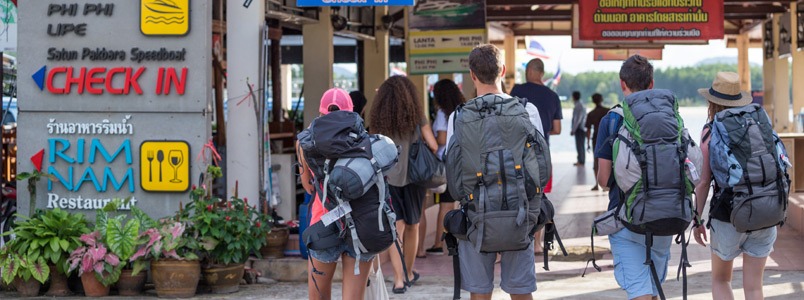


Thais working in the tourism business are used to dealing with foreigners — usually referred to as 'farang'. This doesn't mean that they like everything.
We have to include this one. Drugs are a major problem in Thailand, as in much of Asia, and the laws are strict. Police tactics in fighting the trade include blitzes on nightclubs; entrapment is not unknown. If caught in possession, you'll spend some time in a cell awaiting a court hearing and deportation. If caught 'dealing' you'll spend a very long time in a cell. The harshest penalties are reserved for those caught smuggling. Thai prisons are not pleasant places.
(Visa requirements are subject to change at any time. Tourists should call the consulate for up to date information.)
Most nationalities can obtain visa-free entry, valid for 30 days, on arrival at an International Airport; you'll need a current passport and a return ticket. Longer-stay visas are available, for a fee, from Thai embassies and consulates around the world: specify what kind of visa you want: transit visa (valid 30 days); tourist visa (valid 60 days); non-immigrant visa (valid 90 days and hard to obtain). If you have a tourist visa you can, once in Thailand, apply for a 30 day extension. If you plan to leave Thailand temporarily during your stay and you have a single entry visa, extension of stay or pemanent residence, you must get a re-entry visa, available from the Immigration Department in Phuket City. These rules are subject to change so check current regulations prior to departure.
Customs are usually no trouble, unless you're bringing in or taking out pornography, political propaganda, firearms, large amounts of cash (over $10,000), or illegal drugs. The allowances for the usual luxury goods — perfume, alcohol, tobacco and the like — vary, so check them before departure. Please note that you may be required to show that you're bringing in a minimum amount of currency — the amount varies depending on your visa type.
As a tourist here for a couple of weeks or less, trying to use Thai may be frustrating, but can be fun read more
Many tourists seem to leave common sense at home. Not surprising, really — after all, you've come on holiday to leave all the usual worries and cares behind for a while. Yet it makes no sense to forget normal caution just because you're on holiday. Most of the people you'll meet in Thailand have far less disposable income than you — in many cases their income is a fraction of yours. Thai women are far more conservative in their dress than western women — so to some Thai men, a scantily-clad woman means 'fair game'.
The best overall safety advice is: if you wouldn't do it at home, it's probably best not to do it here.
Every year, particularly in the rainy season, people drown in the sea off Phuket's west coast. Why? Because they ignore the red flags. A red flag means big surf, strong currents and rip tides. It really is quite simple: RED FLAG, DON'T SWIM!
If you go out on a boat trip, think before you dive into that seemingly tranquil water while the boat is at anchor. Tides here can be viciously strong, even in the calm waters of Phang Nga Bay, and you may not be able to swim back to the boat. If in doubt, ask the boat captain or the tour guide. Golden rule: Never, ever jump off a boat without clearing it first with whoever is in charge. At least that way they'll be ready to go after you if you get into trouble.
The unit of currency is the Thai Baht. All major credit cards are widely accepted although you'll often be told there's a surcharge for use of your credit card. If you prefer travellers' cheques, obtain them in Sterling, Euros or US dollars. Currency exchange is available at banks and currency exchange counters. The larger hotels change money, but generally give a poor rate of exchange.
The majority of major hotels include a service charge and local taxes, however a tip of 10-15 per cent for an appreciated service should be considered in restaurants. Tipping in bars is normal practice if you feel the service has been good, similarly tour and excursion guides will expect a tip. If you visit a spa or massage establishment, again give a tip for good service. Tipping tuk-tuk drivers and airport limousine drivers is not the norm.
As with any tourist destination, Phuket has its share dubious operators. Top of that particular league currently are the jet-ski operators. Most embassies strongly advise against hiring jet-skis as the reports of tourists being ripped off are numerous. We're unable to offer advice on how to deal with any incident arising out of jet-ski hire.
All you need to do is exercise a few basic precautions and you should have no worries read more
© Image Asia Events Co., Ltd. Content provided courtesy of IMAGE asia.
